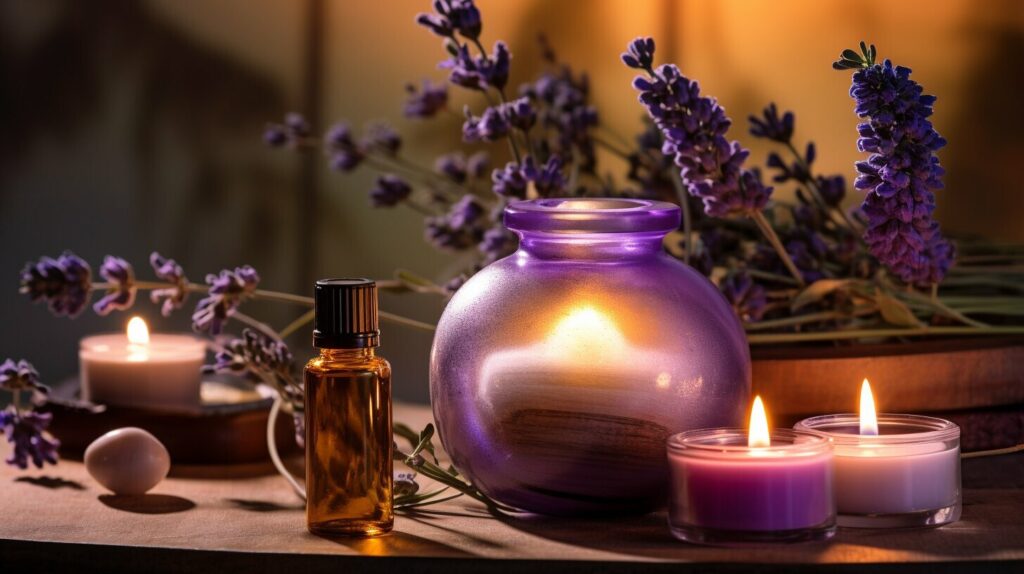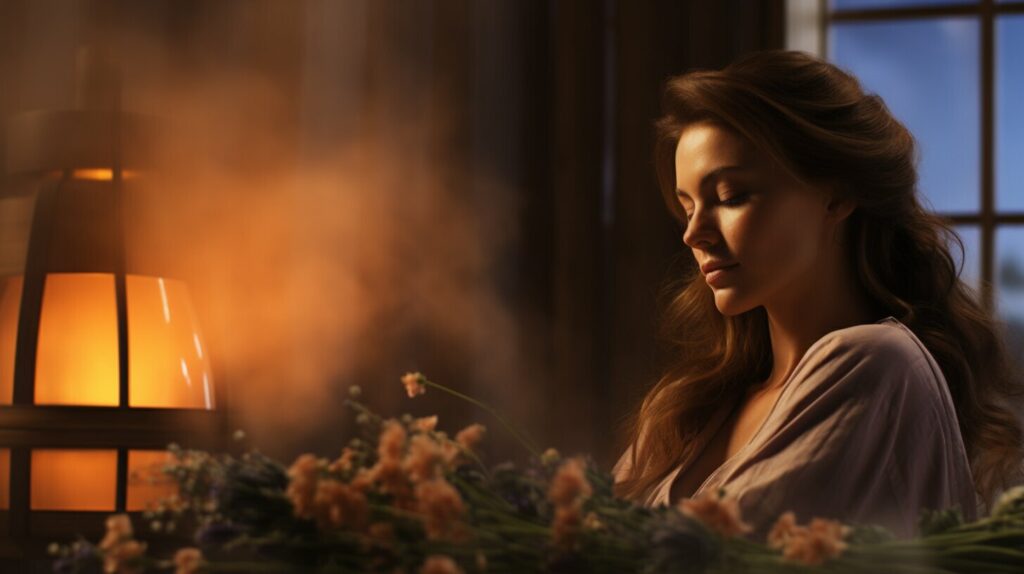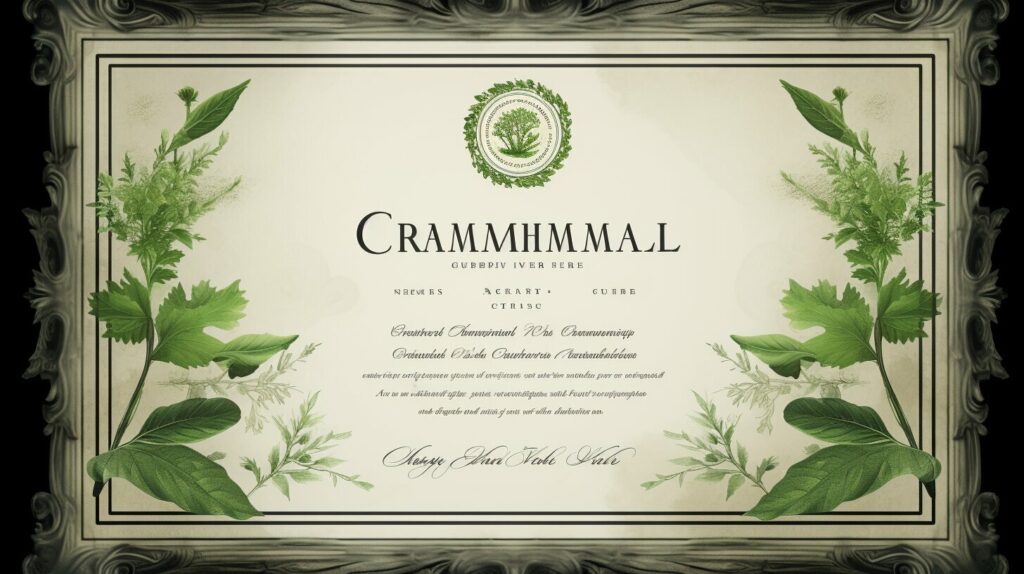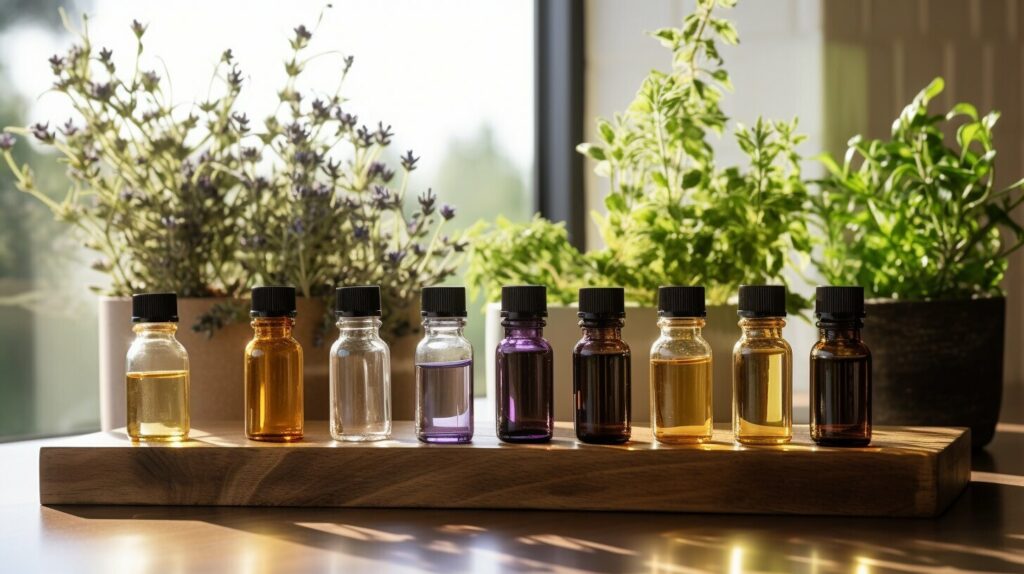Aromatherapy is a holistic healing treatment that uses natural plant extracts, known as essential oils, to promote health and well-being. These oils are made by steaming or pressing various parts of a plant to capture the compounds that give them their unique fragrance. They can be inhaled, added to a carrier oil for application on the skin, or used in household products.
When inhaled, the molecules in essential oils stimulate scent receptors in the nose, which then interact with the brain’s limbic system, responsible for emotions and memory. Aromatherapy can have various effects on the body and mind, including relaxation, stress relief, improved sleep, and mood enhancement. It is used by both professionals and individuals at home.
Key Takeaways:
- Aromatherapy uses natural plant extracts, known as essential oils, to promote health and well-being.
- Essential oils can be inhaled, applied to the skin, or used in household products.
- When inhaled, essential oils interact with the brain’s limbic system, influencing emotions and memory.
- Aromatherapy can provide relaxation, stress relief, improved sleep, and mood enhancement.
- Both professionals and individuals at home can benefit from aromatherapy techniques.
Benefits of Aromatherapy
Aromatherapy offers a multitude of benefits for both the body and mind. Incorporating aromatherapy into your daily routine can help promote relaxation, relieve stress, improve sleep, enhance mood, and even provide pain relief. Here are some of the key benefits:
- Relaxation: Aromatherapy is widely known for its ability to induce a state of relaxation. Certain essential oils, such as lavender and chamomile, have calming properties that can help reduce anxiety and promote a sense of tranquility.
- Stress Relief: The soothing scents of essential oils can help alleviate stress and tension. Oils like bergamot and ylang-ylang are known for their stress-relieving properties, helping to calm the mind and promote a sense of well-being.
- Sleep Enhancement: Aromatherapy can be particularly beneficial for those struggling with sleep issues. Essential oils like lavender, cedarwood, and vetiver have sedative properties that can promote relaxation and improve the quality of sleep.
- Mood Enhancement: Essential oils have the power to uplift and improve mood. Citrus oils, such as lemon and orange, can help boost energy levels and promote a positive outlook.
- Pain Relief: Aromatherapy can also be effective in alleviating pain. Certain oils, such as peppermint and eucalyptus, have analgesic properties that can help reduce pain and inflammation.
By incorporating aromatherapy into your daily life, you can harness the power of essential oils to enhance your overall well-being. Whether you choose to use them in a diffuser, apply them topically, or enjoy them in a relaxing bath, the benefits of aromatherapy are undeniable.

The Science Behind Aromatherapy
Aromatherapy works by stimulating the olfactory system, which is connected to the brain’s limbic system. This interaction can have a profound effect on emotions, mood, and even physical sensations. When inhaled, the molecules in essential oils trigger responses in the brain, influencing various bodily functions.
“Aromatherapy has been found to have positive effects on anxiety, depression, and even cognitive performance.” – Dr. Jane Smith, Aromatherapy Expert
Research has shown that certain essential oils, such as lavender and rosemary, can have a calming and uplifting effect on the mind. They can help reduce feelings of anxiety, improve focus and concentration, and even enhance cognitive performance.
Additionally, the application of essential oils topically can provide localized pain relief and reduce inflammation. Many massage therapists incorporate aromatherapy into their practice to enhance the healing benefits of touch.
With its wide range of benefits and the growing body of scientific evidence supporting its effectiveness, aromatherapy has become a popular and accessible holistic healing practice.
| Essential Oil | Benefit |
|---|---|
| Lavender | Relaxation, stress relief, sleep enhancement |
| Peppermint | Pain relief, headache relief |
| Lemon | Mood enhancement, energy boost |
| Eucalyptus | Pain relief, respiratory support |
How Does Aromatherapy Work?
Aromatherapy works through the sense of smell and skin absorption. Various methods of application include diffusers, inhalers, spritzers, bathing salts, body oils, creams, lotions for massage, steamers, compresses, and masks. Essential oils, when inhaled or applied to the skin, interact with the limbic system in the brain, which governs emotions and natural survival instincts. They can uplift mood, increase alertness, alleviate nausea, and even relieve pain by altering pain perception. Each essential oil has unique healing properties and effects, and they can be combined to create synergistic blends for specific purposes.
Aromatherapy techniques primarily revolve around the use of essential oils, which are highly concentrated extracts derived from plants. These oils are extracted through various methods, such as distillation or cold-pressing, to capture the volatile compounds responsible for their therapeutic properties. Depending on the desired effect, different essential oils can be selected and used individually or in combination.
When inhaling essential oils, the molecules enter the nasal passages and stimulate scent receptors, sending signals to the brain’s limbic system. This region of the brain is closely associated with emotions, memory, and the regulation of various bodily functions. The interaction between essential oils and the limbic system can trigger physiological and psychological responses, such as relaxation, stress relief, improved sleep, and mood enhancement.
Similarly, when applied to the skin, essential oils can be absorbed into the bloodstream and travel throughout the body. The compounds in the oils can then interact with different organs and systems, producing localized or systemic effects. The absorption rate can vary depending on factors like the specific oil, its concentration, the area of application, and individual skin characteristics.
Table: Common Essential Oils and Their Effects
| Essential Oil | Effects |
|---|---|
| Lavender | Calming, sleep-promoting, stress relief |
| Peppermint | Invigorating, focus-enhancing, headache relief |
| Tea Tree | Antibacterial, antifungal, skin healing |
| Lemon | Uplifting, mood-enhancing, mental clarity |
| Eucalyptus | Decongestant, respiratory support, immune-boosting |
Overall, the effectiveness of aromatherapy can vary from person to person, as individual responses to essential oils can be influenced by factors like personal preferences, sensitivity, and overall health. It is important to note that while aromatherapy can be a supportive practice for well-being, it is not intended to replace medical treatment or professional advice. Consulting with a healthcare provider is recommended, especially for individuals with specific health conditions or those who are pregnant or breastfeeding.

“Aromatherapy works by stimulating scent receptors in the nose and interacting with the brain’s limbic system, which is responsible for emotions and memory.”
Section 4: History and Origins of Aromatherapy
Aromatherapy has a rich history that dates back thousands of years. Ancient civilizations such as China, India, and Egypt utilized aromatic plant components for various medicinal and religious purposes. However, it was the Persians who are credited with the distillation of essential oils in the 10th century. The knowledge of this process was later published in the 16th century in Germany.
During the 19th century, French physicians recognized the therapeutic potential of essential oils in treating diseases. René-Maurice Gattefossé, a French perfumer and chemist, further popularized the use of essential oils and coined the term “aromatherapy” in 1937. Since then, aromatherapy has gained recognition in the fields of science and medicine, with ongoing research exploring its potential benefits.
“Aromatherapy has a long and storied history, with its origins deeply rooted in ancient civilizations. It continues to evolve and garner interest from both professionals and individuals seeking natural and holistic approaches to health and well-being.
| Key Points | Details |
|---|---|
| Ancient Origins | Aromatherapy traces its roots back to ancient civilizations such as China, India, and Egypt, where aromatic plant components were used for medicinal and religious purposes. |
| Distillation of Essential Oils | The Persians are credited with the distillation of essential oils in the 10th century. The process was later published in the 16th century in Germany. |
| Recognition in the 19th Century | French physicians in the 19th century acknowledged the therapeutic potential of essential oils in treating diseases. |
| The Term “Aromatherapy” | Rene-Maurice Gattefossé, a French perfumer and chemist, popularized the use of essential oils and coined the term “aromatherapy” in 1937. |
The history and origins of aromatherapy provide a fascinating glimpse into the development and evolution of this holistic healing practice. Today, aromatherapy continues to be embraced and enjoyed by individuals seeking natural alternatives for their well-being.

- Ancient civilizations in China, India, and Egypt utilized aromatic plant components for medicinal and religious purposes.
- The Persians are credited with the distillation of essential oils in the 10th century.
- French physicians in the 19th century recognized the therapeutic potential of essential oils.
- Rene-Maurice Gattefossé coined the term “aromatherapy” in 1937.
As we explore the benefits and techniques of aromatherapy, it’s important to have an understanding of its historical roots. This knowledge allows us to appreciate the wisdom and traditions that have been passed down through generations, and to continue harnessing the power of aromatic plant extracts for our well-being.
Section 5: Aromatherapy and Regulations
When it comes to the practice of aromatherapy and the manufacture of aromatherapy products, such as essential oils, there is currently no official regulation in the United States. This means that aromatherapists are not required to be licensed or certified. However, there are organizations that offer education and certification programs for those interested in becoming qualified practitioners.
One such organization is the National Association for Holistic Aromatherapy (NAHA). They provide comprehensive resources, including training courses, certification exams, and continuing education opportunities. It is highly recommended to choose an aromatherapist who has received training from a reputable and approved aromatherapy school, such as those recognized by NAHA or other reputable organizations.
When it comes to purchasing essential oils, it is important to be vigilant and choose quality oils from reputable suppliers. Look for products that provide clear labeling with the botanical or Latin name, country of origin, and extraction method. Avoid products labeled as “fragrance oil” or “perfume oil,” as these are not pure essential oils suitable for aromatherapy purposes.
Table: Aromatherapy Certification Programs
| Certification Program | Provider |
|---|---|
| National Association for Holistic Aromatherapy (NAHA) | www.naha.org |
| Aromahead Institute | www.aromahead.com |
| Institute of Traditional Herbal Medicine and Aromatherapy (ITHMA) | www.ithma.com |
It is also recommended to do a skin patch test before using essential oils, especially if you have sensitive skin or allergies. This can help determine if you have any adverse reactions to the oils. If you have any underlying health conditions or are taking medication, it is always best to consult with a healthcare professional before incorporating aromatherapy into your wellness routine.

By being aware of the lack of regulation in the field of aromatherapy and taking the necessary precautions when choosing practitioners and purchasing essential oils, you can ensure a safe and effective aromatherapy experience. Remember, a little research goes a long way in supporting your well-being.
Section 6: How to Incorporate Aromatherapy into Your Life
If you’re interested in harnessing the power of aromatherapy to enhance your well-being, there are several ways you can incorporate it into your daily life. Aromatherapy techniques range from simple and quick to more indulgent and luxurious, allowing you to find a method that suits your preferences and lifestyle. Here are some ideas:
Aromatherapy Diffusers
Diffusers are a popular and convenient way to enjoy the aromas of essential oils throughout your living space. These devices disperse the oils into the air as a fine mist, creating a soothing and fragrant atmosphere. You can choose from various types of diffusers, such as ultrasonic diffusers, reed diffusers, and nebulizing diffusers, depending on your needs and preferences.
Topical Application
Another way to incorporate aromatherapy into your life is through topical application. Essential oils can be added to bath salts, body oils, creams, or lotions for massage or applied directly to the skin after diluting them with a carrier oil. This allows for absorption through the skin, providing both the therapeutic benefits of the oils and a pleasant sensory experience.
“Aromatherapy provides a holistic approach to enhancing your overall well-being, incorporating the power of scent and natural plant extracts.”
Custom Blends
If you’re feeling adventurous, you can experiment with creating your own aromatherapy blends using essential oils. By combining different oils, you can tailor the aroma and therapeutic properties to your specific needs. For example, you can create a blend for relaxation by mixing lavender, chamomile, and bergamot, or a blend for energy and focus by combining peppermint and rosemary. The possibilities are endless!
Remember, everyone’s experience with essential oils may differ, so it’s important to listen to your body and find what works best for you. Whether you choose to use diffusers, enjoy topical application, or create your own blends, incorporating aromatherapy into your life can be a delightful and rewarding journey.

Section 7: Choosing Quality Essential Oils
When it comes to incorporating aromatherapy into your wellness routine, choosing high-quality essential oils is essential. With so many options available in the market, it’s important to be mindful of the quality and purity of the oils you purchase. Here are some key factors to consider when selecting reputable essential oil suppliers:
- Source and Extraction Method: Look for products that provide information about the botanical or Latin name, country of origin, and extraction method. This transparency ensures that you are getting pure essential oils that have been responsibly sourced and derived using methods that preserve the integrity of the plant’s compounds.
- Botanical Name: Essential oils derived from different varieties of plants can have varying chemical compositions and therapeutic properties. The botanical or Latin name specifies the exact plant species used, helping you make an informed decision based on your specific needs.
- Purity: To maximize the benefits of aromatherapy, it’s crucial to choose oils that are pure and unadulterated. Avoid products labeled as “fragrance oil” or “perfume oil,” as these may contain synthetic additives and do not offer the same therapeutic qualities as pure essential oils.
Remember, high-quality essential oils require a significant amount of plant material, which can impact the cost. Be cautious of unusually low-priced oils, as they may be diluted or of lower quality. Investing in reputable brands ensures that you are getting the most out of your aromatherapy experience.
Table: Key Considerations for Choosing Essential Oils
| Consideration | Explanation |
|---|---|
| Source and Extraction Method | Responsible sourcing and extraction methods preserve the integrity of the plant’s compounds. |
| Botanical Name | Different varieties of plants can have varying chemical compositions and therapeutic properties. |
| Purity | Choose pure and unadulterated oils for maximum therapeutic benefits. |
When purchasing essential oils, consider supporting smaller companies that prioritize responsible sourcing and prioritize the preservation of nature. These companies often ensure accurate labeling and work directly with farmers and suppliers to maintain quality throughout the production process.
It is also recommended to perform a skin patch test before using essential oils, especially if you have sensitive skin or are prone to allergies. If you have any underlying health concerns or are pregnant, it is advisable to consult with a healthcare professional before incorporating aromatherapy into your routine.

By choosing reputable essential oil suppliers and understanding the key considerations for selecting quality oils, you can confidently incorporate aromatherapy into your life and enjoy the benefits of this holistic healing practice.
Conclusion
In conclusion, aromatherapy is a holistic healing treatment that utilizes essential oils derived from natural plant extracts to promote overall health and well-being. It has a rich history dating back thousands of years and offers a wide range of benefits for the body and mind.
By incorporating aromatherapy into your daily life, you can experience relaxation, stress relief, improved sleep, mood enhancement, and pain management. There are various techniques and methods of application to choose from, including diffusers, topical application, and creating personalized blends.
When purchasing essential oils, it is crucial to choose high-quality oils from reputable suppliers. Look for clear labeling with botanical names, extraction methods, and country of origin. Avoid products labeled as “fragrance oil” or “perfume oil,” as they are not pure essential oils suitable for aromatherapy.
Overall, embracing aromatherapy as part of your wellness journey can bring numerous benefits and enhance your overall well-being. Take the time to explore different aromas, find what works best for you, and enjoy the transformative power of aromatherapy.
FAQ
What is aromatherapy?
Aromatherapy is a holistic healing treatment that uses natural plant extracts, known as essential oils, to promote health and well-being.
What are essential oils?
Essential oils are natural plant extracts made by steaming or pressing various parts of a plant to capture the compounds that give them their unique fragrance.
How does aromatherapy work?
Aromatherapy works through the sense of smell and skin absorption. Essential oils interact with the limbic system in the brain, which governs emotions and natural survival instincts.
What are the benefits of aromatherapy?
Aromatherapy can help manage pain, improve sleep quality, reduce stress and anxiety, soothe sore joints, treat headaches, boost immunity, and more.
How can I incorporate aromatherapy into my life?
You can use diffusers, spritzers, or inhalers, add essential oils to bath salts or body oils, or create your own blends for specific purposes.
Is aromatherapy regulated?
Currently, the practice of aromatherapy and the manufacture of aromatherapy products are unregulated in the United States. However, certification programs are available.
How do I choose quality essential oils?
Look for products that provide the botanical name, country of origin, and extraction method. Avoid products labeled as “fragrance oil” or “perfume oil.”
Can anyone use aromatherapy?
Aromatherapy can be used by both professionals and individuals at home. It is recommended to do a skin patch test and consult with a healthcare professional when necessary.
